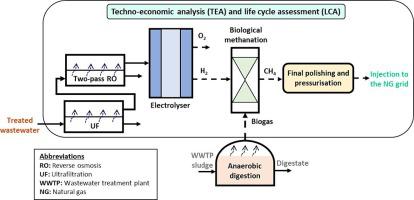当前位置:
X-MOL 学术
›
Energy Convers. Manag.
›
论文详情
Our official English website, www.x-mol.net, welcomes your feedback! (Note: you will need to create a separate account there.)
Exploring the potential of biological methanation for future defossilization scenarios: Techno-economic and environmental evaluation
Energy Conversion and Management ( IF 10.4 ) Pub Date : 2024-03-27 , DOI: 10.1016/j.enconman.2024.118339 Sergi Vinardell , Carolina Feickert Fenske , Amelie Heimann , Jose Luis Cortina , César Valderrama , Konrad Koch
Energy Conversion and Management ( IF 10.4 ) Pub Date : 2024-03-27 , DOI: 10.1016/j.enconman.2024.118339 Sergi Vinardell , Carolina Feickert Fenske , Amelie Heimann , Jose Luis Cortina , César Valderrama , Konrad Koch

|
The REPowerEU plan establishes the production objective of 35 billion m of biomethane in the European Union (EU) by 2030. Biomethane is an excellent energy vector to promote the defossilization of different sectors within a Power-to-Gas approach. The present study evaluates the economic and environmental implications of producing biomethane from the biogas generated in a municipal wastewater treatment plant (WWTP) with a treatment capacity of 100,000 m/d and 500,000 population equivalents. The techno-economic analysis (TEA) and life cycle assessment (LCA) were conducted for a biomethane production plant based on biological methanation process using the hydrogen produced in a water electrolyser. The TEA illustrated that the electricity price (0–0.20 €/kWh) features an important impact on the biomethane cost (0.05–0.23 €/kWh) due to the high electrolyser energy consumption. Flexible operation of the electrolyser is economically feasible at load factors above 35 %, which can be attributed to the lower impact of the electrolyser capital cost as the load factor increases. The LCA illustrated that biomethane has a lower global warming impact (<0.28 kgCO/kWh) than fossil natural gas when the renewable electricity production in the mix is above 62 %. The results highlighted that high carbon prices under the EU Emission Trading System is an important driver to promote biomethane production in European countries since energy production from biomethane could be exempted to acquire emission allowances. This would provide a competitive advantage of biomethane over natural gas when considering the whole supply chain of the energy carrier. Overall, this study demonstrates that biological methanation has the potential to become an important biomethane production technology for future defossilization scenarios.
中文翻译:

探索生物甲烷化在未来去化石化方案中的潜力:技术经济和环境评估
REPowerEU计划设定了到2030年欧盟(EU)生产350亿立方米生物甲烷的目标。生物甲烷是一种极好的能源载体,可以通过电转气的方式促进不同部门的去石化。本研究评估了从处理能力为 100,000 m/d、500,000 人口当量的城市污水处理厂 (WWTP) 产生的沼气生产生物甲烷的经济和环境影响。对利用水电解槽产生的氢气进行生物甲烷化工艺的生物甲烷生产厂进行了技术经济分析(TEA)和生命周期评估(LCA)。 TEA 表明,由于电解槽能耗较高,电价(0-0.20 欧元/kWh)对生物甲烷成本(0.05-0.23 欧元/kWh)具有重要影响。在负载率高于 35% 时,电解槽的灵活运行在经济上是可行的,这可归因于随着负载率的增加,电解槽资本成本的影响较小。 LCA 表明,当混合中的可再生电力产量高于 62% 时,生物甲烷对全球变暖的影响(<0.28 kgCO/kWh)比化石天然气更低。结果强调,欧盟排放交易体系下的高碳价格是促进欧洲国家生物甲烷生产的重要驱动力,因为生物甲烷能源生产可以免除获得排放配额。在考虑能源载体的整个供应链时,这将提供生物甲烷相对于天然气的竞争优势。总体而言,这项研究表明生物甲烷化有潜力成为未来去石场景的重要生物甲烷生产技术。
更新日期:2024-03-27
中文翻译:

探索生物甲烷化在未来去化石化方案中的潜力:技术经济和环境评估
REPowerEU计划设定了到2030年欧盟(EU)生产350亿立方米生物甲烷的目标。生物甲烷是一种极好的能源载体,可以通过电转气的方式促进不同部门的去石化。本研究评估了从处理能力为 100,000 m/d、500,000 人口当量的城市污水处理厂 (WWTP) 产生的沼气生产生物甲烷的经济和环境影响。对利用水电解槽产生的氢气进行生物甲烷化工艺的生物甲烷生产厂进行了技术经济分析(TEA)和生命周期评估(LCA)。 TEA 表明,由于电解槽能耗较高,电价(0-0.20 欧元/kWh)对生物甲烷成本(0.05-0.23 欧元/kWh)具有重要影响。在负载率高于 35% 时,电解槽的灵活运行在经济上是可行的,这可归因于随着负载率的增加,电解槽资本成本的影响较小。 LCA 表明,当混合中的可再生电力产量高于 62% 时,生物甲烷对全球变暖的影响(<0.28 kgCO/kWh)比化石天然气更低。结果强调,欧盟排放交易体系下的高碳价格是促进欧洲国家生物甲烷生产的重要驱动力,因为生物甲烷能源生产可以免除获得排放配额。在考虑能源载体的整个供应链时,这将提供生物甲烷相对于天然气的竞争优势。总体而言,这项研究表明生物甲烷化有潜力成为未来去石场景的重要生物甲烷生产技术。



























 京公网安备 11010802027423号
京公网安备 11010802027423号